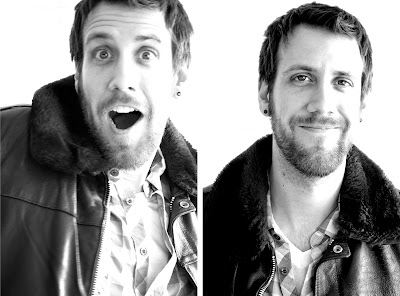My Friend Robert: Fellow Actor/Singer/Introvert
 |
| The chameleon at work. |
So, this is my friend, Robert. Strangely, until Godspell in June, every show I'd been in while living in Tulsa, Robert had been in, too. (I took breaks between while Robert kept acting away. He doesn't take many breaks, this guy.)
I like acting with Robert. Beneath the quiet outer layer is an actor who can bring subtlety and nuance to his character choices. He is skilled at nonverbal communication, and thinks deeply about what he is doing. And really, about everything, as you'll see in this post.
I was telling my husband the other day about something important I've learned from Robert: actions really do speak louder than words. To find the truth, don't worry about what people say; watch what they do.
Case in point: One day in early December 2011, during tech week for A Christmas Carol, I was maxed out. I'd hit this super vulnerable, needy, exhausted place, and Robert seemed like the guy to talk to. We had become friends during the show, and he had recently recommended that I audition for the next show he was in.
I found him in the hallway and lamented how I was feeling all unsure about myself as an actress and a singer. Though I'd come in search of magical reassuring words, he instead pointed me to facts. He asked, in a tone more logically truthful than flattering, "Would I have recommended you for The Mousetrap if I didn't think you were talented?"
Good point, Robert. Way to cut through all the drama.
 |
| Rehearsing Bob Cratchit in A Christmas Carol |
Like now, for instance.
R: I have always thought of myself as a chameleon, due to my ability to blend into any crowd or situation. And I still think that is true, but I can’t admit that I’m comfortable doing that and I hate losing myself. So, I decided to do some research (I like to research things), and I found a couple of legitimate psychological insights about human-animal similarities. Using my traits, I discovered that I am actually very similar to a penguin. I wish I could put it into my own words, but I thought this summed me up incredibly well:
"Aggressive yet gentle, outgoing but shy, stable yet flighty - everyone sees the penguin in a different way. It's that black and white thing: the penguin only reveals the side that it wants to you to see. So whether you like this darling-devil or not, you have to concede that it's a fascinating and enigmatic individual."
"Penguins are deceptively intelligent and are particularly animated when intellectually challenged. They excel at word games and puzzles but are modest about their abilities and are generally underestimated by others."
"With a natural aptitude for languages, penguin personalities dominate the world of publishing as writers, editors and journalists. A strong sense of drama draws them to the theater and cinema, although unlike typical bird personalities they avoid the spotlight unless they're able to hide behind the characters they play. Once on stage however, they prove to be excellent performers with their multifaceted personalities conveying the full gamut of emotions.
However, a lack of confidence affects their work."
(http://animalinyou.com/profile.php?a=penguin)
E: What was your first inspiration for acting?
R: My parents enrolled me in a summer performing arts camp at Clark Theatre when I was in 3rd grade. After that, I was hooked.
E: What role that you've played have you identified with most closely?
R: I’ve only recently discovered how well it fits with me, but I most identify with the character of Shu Fu from “Good Woman of Setzuan”. In the story, Shu Fu has fallen in love with the main character, Shen Te. So, he uses his money to help Shen Te continue her good works, thinking that offering financial resources is the best way to show his love.
Admittedly, I’ve fallen into that trap before. I’ve often forgotten that love is a sharing of “myself”, not just my resources and it’s a constant process to remind myself that I am more than just the things I own.
 |
| In Narrow View? Try a Broad Way (photo credit Ryan Fox/Tara Moses) |
type?
R: I tend to be cast as the “straight-man” or more “reserved” characters. I think some of that comes from the fact that I am generally an introverted person, and so until I’ve become more comfortable with the people I am working with, I tend to be quiet and to-myself. However, as I’ve started working with the same directors and actors again, I’ve been able to break out of my shell a little more and start doing some other types of roles.
E: What are your dream roles?
R: I tend to avoid having “dream roles”. I have known multiple actors who get (dare I say it?) obsessed with certain “dream roles” and when they don’t get to fulfill that dream (either they don’t get cast in the part or they age-out of the part), they get incredibly depressed about it. That is not to say there is anything wrong with having goals or particular parts that intrigue an actor, but for me, it is more important to have a “dream type-of-role” than it is to have a specific “dream role”. I am actually getting to play a “dream type-of-role” right now in “Show People”, and I can feel a difference in my level of excitement and amount of work that I’m putting into this character; I just don’t feel that level of excitement should be limited to one “dream role”.
Having said that, I will admit to having “dream shows”. I would love to do “Merrily We Roll Along” again, as well as “Sweet Charity”, “Company”, “Starlight Express” (the music is awful, but come on, rollerskates!), “City of Angels”, and “The Who’s Tommy”. As for plays, “Les liaisons dangereuses”, “33 Variations”, and “Clybourne Park” are on the top of my list.
E: What do you think it is about you that compels you to be an actor?
R: The need for a creative outlet and the need for validation. I’m a software developer by day, and there is certainly a level of artistry that comes with that, but it is still somewhat task-driven and logic-focused; it perfectly matches “who I am”. Performing gives me an opportunity to break from my everyday existence and try out some other lives, think different thoughts, and experience some situations of which I’d otherwise steer clear.
As for validation, let’s be honest: nearly every actor is seeking validation of some sort; otherwise, we wouldn’t put ourselves up on the stage in front of an audience. We all want to be told that we did a great job, even if we don’t know how to react to praise. We all want to be told that our effort entertained, or moved, or inspired someone.
E: What have you learned from acting?
R: The biggest thing I have learned from acting actually has to do more with actors, and that’s to keep your personal life and your character’s life separate I have seen too many actors who can’t seem to leave their character at the theatre, bringing elements of the story, situation, and emotions home with them. And vice-versa, they bring personal problems onto the stage and end up using the stage as a sounding board, thus preventing them from moving past an indiscretion or painful situation. Theatre can be therapeutic, but cannot be therapy. The reason we are watching this story on the stage is because the situation is heightened; it does not equal real life.
E: Who are your top five favorite famous actors?
R: I’ve been really impressed with Ryan Gosling (plus, he’s not bad on the eyes!). I’d also include Leonardo DiCaprio, Jake Gyllenhaal, and Zachary Quinto. And a recent surprise to me was Bryan Cranston. I’ve recently been watching Breaking Bad; and there was this scene in which he was watching a woman die. He just stood there, his face didn’t move, but there was something about his eyes where you could see the conflict within him as to whether he should or shouldn’t help. I never would’ve guessed that lovable, bumbling Hal from Malcolm in the Middle would be capable of this…
E: What else should we know?
R: I’ve been asked about whether I would consider moving to a larger theatre market, and I would be lying if I hadn’t thought on occasion about doing it. But, I am really happy with the theatre scene here and the opportunities it affords me. I see so many actors with the only goal of “making it” on Broadway; and for many of them, they won’t “make it”. But, I believe that whether you are performing in a mega-market like NYC or a small-town like Walla Walla, the value of your performance and the effect is has on the audience is no different. I live in a centrally-located city with several cultural and environmental amenities, near my family, with a job that pays well, in a house I can afford, surrounded by friends who support me, AND I get to be on stage doing something I love… Why would I want to leave that?
E: What do you think is the best thing about the Tulsa theater scene?
R: The Tulsa theatre scene was very “exclusive” for a long time, but I have seen dramatic improvement over the years in that arena. There was a territoriality in which certain actors only worked with certain companies, and certain companies kept their auditions closed. And, that isn’t to say there isn’t still a little bit of that going on (what community or industry DOESN’T have a little bit of that), but I’m starting to see that change. Perhaps it is because the talent pool has seemingly grown recently or because the theatrical elites are abdicating some of their “power”, I don’t honestly know, but it is a good thing for both actors and the community that they serve.
E: What is it like balancing work and acting?
R: It is tough at times. I have had to miss rehearsals due to mandatory overtime or software deployments; and I have brought my script up to the office on more than one occasion (I literally have the script for my current play, “Show People”, sitting between my monitors as I am writing this). I constantly feel over-committed and exhausted, and yet I keep doing it.
 |
| As Trevor Graydon, in rehearsal for Thoroughly Modern Millie |
The photos on this post were taken with my Nikon D3100 camera (top three) and my Droid X cell phone (bottom).
One photo is not by me, and is marked as such.
One photo is not by me, and is marked as such.


Comments
Post a Comment